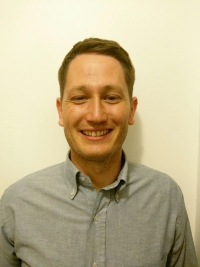Mennonite Health Journal
Articles on the intersection of faith and health
Mennonite Health Journal, Vol. 18, No. 8, September 30, 2016
MHF Student Elective Term (SET) Report PDF version
Keith Suter
May 28 – August 1, 2016
Machala, Ecuador
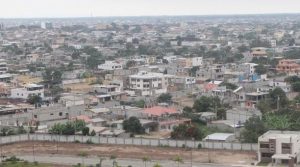 With the support of an educational grant from Mennonite Healthcare Fellowship (MHF), I spent my Student Elective Term (SET) in Machala, Ecuador. A mid-sized coastal city in southern Ecuador, Machala’s growth has outpaced the development of many public services and economic resources. This has done little to change the rich culture and strong pride of the city.
With the support of an educational grant from Mennonite Healthcare Fellowship (MHF), I spent my Student Elective Term (SET) in Machala, Ecuador. A mid-sized coastal city in southern Ecuador, Machala’s growth has outpaced the development of many public services and economic resources. This has done little to change the rich culture and strong pride of the city.
A recurring health problem in Machala is the prevalence of mosquito transmitted diseases such as dengue fever, chikungunya and zika. Transmitted by the Aedes agyepti mosquito, these infectious diseases can be difficult to control. As part of my practicum experience, I was working with a local team through a collaboration with SUNY Upstate.
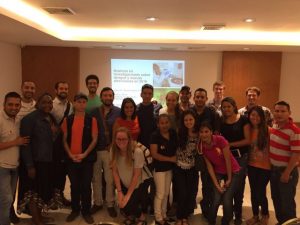 I was glad to work with an organization filled with knowledgeable, experienced, and friendly staff. I quickly realized that while I was there to help, I would be doing more learning. The first few weeks were spent learning about the ongoing projects and the specific challenges to combatting dengue fever in Machala. The carrier of these infectious diseases is the female Aedes agyepti mosquito. While most mosquitos bite during the night, the Aedes agyepti are daytime biters. Although bed nets are useful to prevent nuisance biting, avoiding the Aedes agyepti requires a more comprehensive approach. Since they are able to breed in standing water the size of a bottle cap, controlling breeding sites is a tall order. This is especially difficult when families have limited access to piped water and must rely on stored water.
I was glad to work with an organization filled with knowledgeable, experienced, and friendly staff. I quickly realized that while I was there to help, I would be doing more learning. The first few weeks were spent learning about the ongoing projects and the specific challenges to combatting dengue fever in Machala. The carrier of these infectious diseases is the female Aedes agyepti mosquito. While most mosquitos bite during the night, the Aedes agyepti are daytime biters. Although bed nets are useful to prevent nuisance biting, avoiding the Aedes agyepti requires a more comprehensive approach. Since they are able to breed in standing water the size of a bottle cap, controlling breeding sites is a tall order. This is especially difficult when families have limited access to piped water and must rely on stored water.
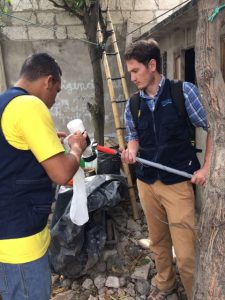 A large project of the dengue team in Machala is an ongoing “cluster” study. When a patient reports to a clinic with dengue-like symptoms the team visits the home of that patient and conducts a survey about the perceptions of dengue fever and then samples the blood of the family members. They also use this opportunity to collect live mosquito samples and provide information about reducing the number of mosquito breeding sites around their home. After meeting with the index patient, the team searches for four houses within close proximity to also conduct the survey
A large project of the dengue team in Machala is an ongoing “cluster” study. When a patient reports to a clinic with dengue-like symptoms the team visits the home of that patient and conducts a survey about the perceptions of dengue fever and then samples the blood of the family members. They also use this opportunity to collect live mosquito samples and provide information about reducing the number of mosquito breeding sites around their home. After meeting with the index patient, the team searches for four houses within close proximity to also conduct the survey 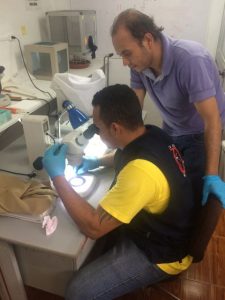 and samples. With this information, the team is able to quickly identify potential outbreaks of dengue fever and provide information to very relevant populations. Once the blood samples have been collected, they are tested for dengue fever in a lab in Guayaquil, Ecuador. A team of experienced entomologists classifies the mosquitos collected and with years of data can get a picture of mosquito numbers and species in Machala. Additional projects include climate sensor data to compare disease incidence and climate change, economic studies, and a cohort study that will work with individuals monthly over a three-year period.
and samples. With this information, the team is able to quickly identify potential outbreaks of dengue fever and provide information to very relevant populations. Once the blood samples have been collected, they are tested for dengue fever in a lab in Guayaquil, Ecuador. A team of experienced entomologists classifies the mosquitos collected and with years of data can get a picture of mosquito numbers and species in Machala. Additional projects include climate sensor data to compare disease incidence and climate change, economic studies, and a cohort study that will work with individuals monthly over a three-year period.
My experience in Ecuador was made rewarding by a number of factors. First, the expertise of the local team provided on-the- ground public health insight that is difficult to learn in the classroom. Second, I learned about the complex nature of global health and the many collaborations that it requires. Finally, I will never forget the warm reception that I received from all the persons I met, despite my limited language skills. While my time in Machala was short, many of the team members have devoted their lives to preventing infectious disease and improving the health of their community. This is a lesson I hope to carry into my public health career.
About the author
Keith Suter
Keith Suter grew up in Pandora, Ohio where he attended Grace Mennonite Church. In 2012 he graduated from Bluffton University where he received a BA in Social Sciences. Upon graduation he moved to Washington, DC for a yearlong commitment working with low income immigrants as part of the Mennonite Voluntary Service program. He is currently living in Denver, Colorado pursuing a Master’s degree in public health at the University of Colorado. He plans to spend his Student Elective Term in Machala, Ecuador working on dengue fever prevention and surveillance.

